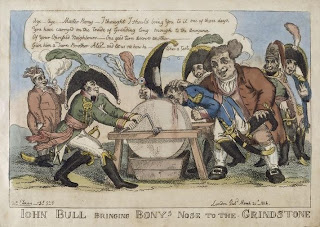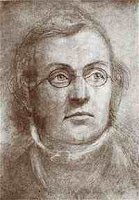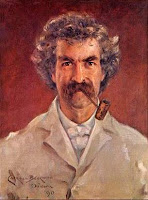
So my new agent has the latest version of edits for my Regency-set historical, Road To Passion (the title of which she says, as others have, that she is reminded of Bob Hope. Bob Hope = Not Sexy. New Title being brainstormed now), and she will be submitting it to editors soon.
Meanwhile, I have begun Road To Desire (I know! Still Bob Hope! But that’s the title in my head!), and it is so much fun to start writing NEW stuff after laboring so long over the old.
My hero this time is a low-born soldier, raised on London streets and out for revenge after returning from the wars. He’s got a crazy-hot temper, is aggressive, bold, confident and super-sexy.
My heroine is an Earl’s daughter, on the run from a controlling uncle and his leering son, off to find her fiance, who’s just come home from the battlefield.
(Note to readers: The hero is not her fiance. Really, how boring would that be?)
Whether you’re starting to write or to read a new book, the beginning is so crucial:
(Some of the) 100 Best First Lines from Novels
1. Call me Ishmael. —Herman Melville, Moby-Dick (1851)
2. It is a truth universally acknowledged, that a single man in possession of a good fortune, must be in want of a wife. —Jane Austen, Pride and Prejudice (1813)
3. A screaming comes across the sky. —Thomas Pynchon, Gravity’s Rainbow (1973)
4. Many years later, as he faced the firing squad, Colonel Aureliano Buendía was to remember that distant afternoon when his father took him to discover ice. —Gabriel García Márquez, One Hundred Years of Solitude (1967; trans. Gregory Rabassa)
5. Lolita, light of my life, fire of my loins. —Vladimir Nabokov, Lolita (1955)
6. Happy families are all alike; every unhappy family is unhappy in its own way. —Leo Tolstoy, Anna Karenina (1877; trans. Constance Garnett)
7. riverrun, past Eve and Adam’s, from swerve of shore to bend of bay, brings us by a commodius vicus of recirculation back to Howth Castle and Environs. —James Joyce, Finnegans Wake (1939)
8. It was a bright cold day in April, and the clocks were striking thirteen. —George Orwell, 1984 (1949)
9. It was the best of times, it was the worst of times, it was the age of wisdom, it was the age of foolishness, it was the epoch of belief, it was the epoch of incredulity, it was the season of Light, it was the season of Darkness, it was the spring of hope, it was the winter of despair. —Charles Dickens, A Tale of Two Cities (1859)
10. I am an invisible man. —Ralph Ellison, Invisible Man (1952)
11. The Miss Lonelyhearts of the New York Post-Dispatch (Are you in trouble?—Do-you-need-advice?—Write-to-Miss-Lonelyhearts-and-she-will-help-you) sat at his desk and stared at a piece of white cardboard. —Nathanael West, Miss Lonelyhearts (1933)
12. You don’t know about me without you have read a book by the name of The Adventures of Tom Sawyer; but that ain’t no matter. —Mark Twain, Adventures of Huckleberry Finn (1885)
13. Someone must have slandered Josef K., for one morning, without having done anything truly wrong, he was arrested. —Franz Kafka, The Trial (1925; trans. Breon Mitchell)
14. You are about to begin reading Italo Calvino’s new novel, If on a winter’s night a traveler. —Italo Calvino, If on a winter’s night a traveler (1979; trans. William Weaver)
15. The sun shone, having no alternative, on the nothing new. —Samuel Beckett, Murphy (1938)
16. If you really want to hear about it, the first thing you’ll probably want to know is where I was born, and what my lousy childhood was like, and how my parents were occupied and all before they had me, and all that David Copperfield kind of crap, but I don’t feel like going into it, if you want to know the truth. —J. D. Salinger, The Catcher in the Rye (1951)
17. Once upon a time and a very good time it was there was a moocow coming down along the road and this moocow that was coming down along the road met a nicens little boy named baby tuckoo. —James Joyce, A Portrait of the Artist as a Young Man (1916)
18. This is the saddest story I have ever heard. —Ford Madox Ford, The Good Soldier (1915)
19. I wish either my father or my mother, or indeed both of them, as they were in duty both equally bound to it, had minded what they were about when they begot me; had they duly considered how much depended upon what they were then doing;—that not only the production of a rational Being was concerned in it, but that possibly the happy formation and temperature of his body, perhaps his genius and the very cast of his mind;—and, for aught they knew to the contrary, even the fortunes of his whole house might take their turn from the humours and dispositions which were then uppermost:—Had they duly weighed and considered all this, and proceeded accordingly,—I am verily persuaded I should have made a quite different figure in the world, from that, in which the reader is likely to see me. —Laurence Sterne, Tristram Shandy (1759–1767)
20. Whether I shall turn out to be the hero of my own life, or whether that station will be held by anybody else, these pages must show. —Charles Dickens, David Copperfield (1850)
My first lines, as they stand now, are these:
“Get your stinking farmers’ hands off me.”
The words were spoken in a furious rumble that left no doubt as to the speaker’s feelings. His accent wasn’t the ones she was used to hearing here; he spoke much more quickly, his vowels broader than the usual Northern mumble.
What are your favorite first lines?
Megan
 Or, if Coleridge wrote Star Trek…
Or, if Coleridge wrote Star Trek… He holds her with his skinny hand,
He holds her with his skinny hand,









